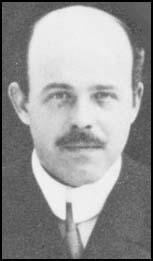Nicholas Longworth

Nicholas Longworth was born in Cincinnati, Ohio, on 5th November, 1869. He was educated at Harvard University and Cincinnati Law School and was admitted to the bar in 1894.
A member of the Republican Party, Longworth was elected to Congress in 1902. Four years later he married Alice Roosevelt, the daughter of Theodore Roosevelt.
Longworth was majority leader (68th Congress) and Speaker of the House of Representatives (69th-71st Congress). Nicholas Longworth died on 9th April, 1931.
Primary Sources
(1) Alice Roosevelt Longworth, interviewed by Michael Teague in 1981.
I used to go to the debates a lot, especially during the early days of the League of Nations. We were against the League because we hated Wilson, who was a Family Horror. He couldn't do any good in our eyes because he had beaten Father. We felt that my father had advocated the idea of the League of Nations in his Nobel prize acceptance speech. And then Taft had come up with his League to Enforce Peace and we had squabbled about that. We didn't like other people's Leagues muscling in on our own. It was entirely personal politics designed purely to annoy. As far as I was concerned anyway. All that nonsense about my killing the League with a bunch of diehard cronies is ridiculous. It is true that I took a great interest in the debates but I don't think I influenced matters one way or another. Wilson could have had his League any time. All he had to do was to take the reservations. But he had a slowness which verged on stupidity. We were not irreconcilable but we were against the League in that form.
(2) Alice Roosevelt Longworth, interviewed by Michael Teague in 1981.
There were a number of really able members of the Senate in the twenties, Jim Reed, Oscar Underwood, John Sharp Williams, and Bill Borah among them. Jim Reed was a fantastic orator with a saturnine voice. We were driving around near Wilson's house the night after he died and there were a lot of people there weeping and on their knees. "Like fleas who have lost their dog," he said with his distinctive snarl.
Borah was a great friend. Like Reed, he was a great speaker. He had never been abroad. He had nearly drowned as a child apparently and he was afraid of crossing water. He came from a remote area of Illinois known as Little Egypt because of its flat delta land. He had a great leonine head and was a fascinating conversationalist. He could hold one spellbound for hours with tales of labor disputes in Illinois at the turn of the century. Unusual subjects like that. But there was a withdrawn, rather secretive quality about him, which seemed to hold him back. He was a most intriguing person.
Both John Lewis, who was another close friend, and Borah were remarkably similar in looks and also, to some extent, in temperament. They had the same large, shaggy heads and they both alternated between being very stimulating or very taciturn. They were never boring. Humor was the great bond between us.
Someone should do a study on charm in politics. People like my father, like Franklin, like Jack Kennedy were very engaging to begin with. When you add to that the glamor attached just to being in the White House, they become almost irresistible. The particular charm of the Kennedys was that they had a good deal of fun and often had their tongues in their cheeks at the same time. The Nixons didn't.
The Kennedys reminded me of all those Irish who came over in the 1840s. They seemed to have a rather special quality. There were all these marvelous-looking kitchen maids and policemen, who might easily be Sargent Shriver. I'm not being snobbish. It's just that rare quality which the Irish and no other nation seem to have. I never had much time for old Joe Kennedy but I've always thought Rose Kennedy is an extraordinary woman and it was fun to see her delightful offspring enjoying themselves.
The Kennedys were a fascinating, incredible outfit. There hasn't been anything like them since the Bonapartes. I had great fun with them, especially Jack. He loved to tease and he could be very amusing. He also had a real feeling for learning. Both he and Bobby were eager to supplement their education by learning more. They really wanted to know.
